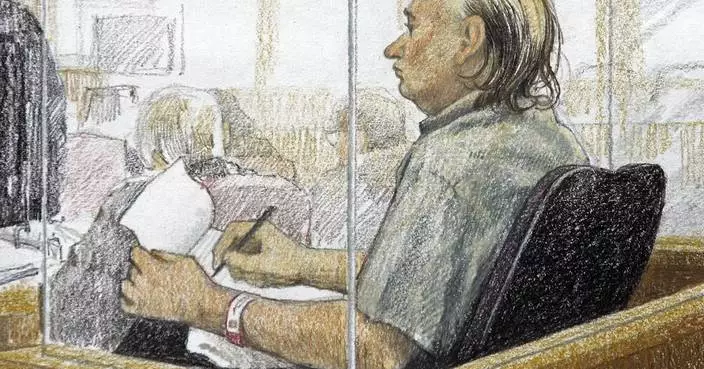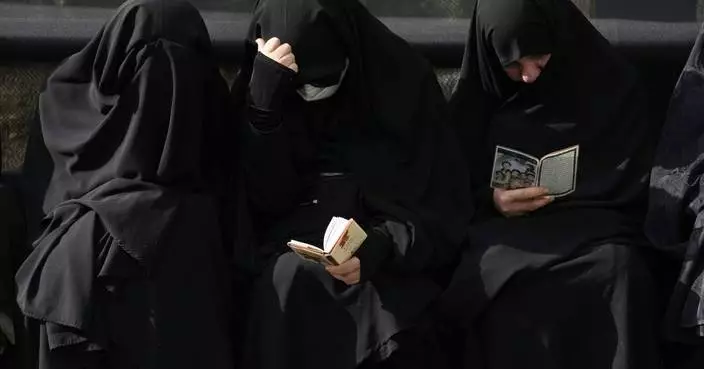OKLAHOMA CITY (AP) — Republican-led states are rushing to give broader powers to local police and impose criminal penalties for those living in the U.S. illegally as the issue of immigration enforcement remains central to the 2024 elections.
Oklahoma's Republican Gov. Kevin Stitt signed a bill on Tuesday that creates the new crime of “impermissible occupation,” which imposes penalties of as much as two years in prison for being in the state illegally.
Oklahoma is among several GOP-led states jockeying to push deeper into immigration enforcement as both Republicans and Democrats seize on the issue. That was illustrated in February when President Joe Biden and former President Donald Trump both visited the U.S.-Mexico border the same day and tussled from a distance over blame for the nation's broken immigration system and how to fix it.
Here are some things to know about the latest efforts in various states to target immigration:
Lawmakers in Oklahoma followed the lead of Texas, where Gov. Greg Abbott signed a bill last year that would allow the state to arrest and deport people who enter the U.S. illegally. That law is currently on hold while the 5th U.S. Circuit Court of Appeals considers a challenge brought by the U.S. Department of Justice.
Opponents consider the law to be the most dramatic attempt by a state to police immigration since an Arizona law more than a decade ago, portions of which were struck down by the Supreme Court.
Oklahoma's law, which takes effect July 1, makes it illegal to remain in the state without legal authorization, with a first offense a misdemeanor punishable by as much as a year in jail. Violators would be required to leave the state within 72 hours of being released from custody. A second and subsequent offense would be a felony punishable by as much as two years in prison.
“I want our Hispanic community to rest assured that this law does not give law enforcement the authority to profile individuals or question them about their immigration status without reasonable suspicion of a crime,” Stitt said in a statement.
Senate President Pro Tempore Greg Treat, who carried the bill in the Senate, voiced frustration with the federal government and Congress for not taking more definitive steps to solve the immigration problem.
“The federal government has failed. The U.S. Congress, they have not done anything to impact it,” said Treat, an Oklahoma City Republican. “So what can we do? We can say you have to be here legally in Oklahoma.”
Outside the state Capitol, more than 100 people gathered last week in opposition to the bill.
Sam Wargin Grimaldo, 36, an attorney from south Oklahoma City whose mother emigrated from Mexico in 1979, urged those who rallied to register to vote and become more politically engaged.
Grimaldo said many Latinos in Oklahoma are frightened about the new law.
“We feel attacked," said Grimaldo, wearing a shirt that read, “Young, Latino and Proud.” "People are afraid to step out of their houses if legislation like this is proposed and then passed.”
Tennessee Gov. Bill Lee has signed a bill requiring law enforcement agencies to communicate with federal immigration authorities if they discover people are in the the country illegally, and would broadly mandate cooperation in the process of identifying, detaining and deporting them. That bill takes effect July 1. Another proposal there would allow sentencing enhancements up to life in prison for someone in the country illegally who commits a violent crime.
In Iowa, Republican Gov. Kim Reynolds signed a bill this month that mirrors part of the Texas law. Another approach at a Texas-style bill is advancing in Louisiana. Idaho lawmakers considered a similar measure but adjourned without passing it.
Georgia lawmakers passed a bill that seeks to force jailers to check immigration status, part of a continuing political response to the killing of a nursing student on the University of Georgia campus, allegedly by a Venezuelan man.
Florida Gov. Ron DeSantis signed a bill last month to increase prison and jail sentences for immigrants in the United States illegally if they are convicted of felonies or of driving without a license.
Like Texas' new law, many of the bills are almost certain to face legal challenges because immigration is a federal, not a state, issue under the U.S. Constitution, said Kelli Stump, an immigration attorney in Oklahoma City and the president-elect of the American Immigration Lawyers Association.
“The whole thing is a mess and the system is broken, but the Constitution says that states handle state issues and the feds handle federal issues,” Stump said. “This will ultimately end up at the Supreme Court if I'm a betting person.”
Associated Press reporters Jonathan Mattise in Nashville, Tennessee, and Jeff Amy in Atlanta contributed to this report.

FILE - People at the Keep Families Together rally as the son of Holocaust survivors speaks about the importance of offering asylum in the South Plaza of the Oklahoma State Capitol Building in Oklahoma City, Okla. on Saturday, June 30, 2017. The Oklahoma Senate on Tuesday, April 24, 2024, gave final approval to a bill that would make illegal immigration a crime. (Anya Magnuson/The Oklahoman via AP, File)

FILE - Marilyn McCulloch and Emily Bickers, both of Tulsa, stand with a group of protestors during a rally against the detaining of immigrant families in front of David L. Moss Criminal Justice Center on Saturday, June 30, 2018, in Tulsa, Okla. The Oklahoma Senate on Tuesday, April 24, 2024, gave final approval to a bill that would make illegal immigration a crime. (Ian Maule/Tulsa World via AP, File)

Oklahoma City immigration attorney Sam Wargin Grimaldo speaks to a group outside the Oklahoma Capitol on Tuesday, April 23, 2024, who opposed a bill that would impose criminal penalties to be in the state illegally. Oklahoma is one of several GOP-led states seeking to give broader immigration enforcement powers to local police. (AP Photo/Sean Murphy)
NEW YORK (AP) — Israel's shutdown and seizure of an Associated Press video camera that provided a live glimpse into Gaza alarmed many journalists, who worried Tuesday about wider implications for coverage of a war largely fought out of the world's sight to begin with.
After widespread condemnation, including a call by the Biden administration on Israel to back off, authorities returned AP's equipment late Tuesday. Israel had justified its move by saying the agency violated a new media law that bans Al Jazeera, since the Qatari satellite channel is one of thousands of customers that receive live AP video.
By early Wednesday, the AP’s live video of Gaza was back up in Israel.
The camera confiscated earlier, located in the southern Israeli town of Sderot, was not the only one AP operated in Israel or Gaza — the company would not say how many it uses regularly — nor is AP the only news organization to do so. Agence France-Presse confirmed it has frequently used such cameras in Israel and also sells its images to Al Jazeera.
“Israel's move to restrict AP's work today is extremely concerning and a clear attack on press freedom,” said Phil Chetwynd, AFP's global news director.
News organizations expressed worry about the potential ambiguity in how Israel's law could be enforced. What, they asked, prevents Israel from shutting down the news cooperative's operations in the country altogether?
“It also could allow Israel to block media coverage of virtually any news event on vague security grounds,” Israel's Foreign Press Association said in a statement.
Israel also denies foreign journalists entry into Gaza to cover a war that began following Hamas' Oct. 7 attacks inside the Jewish state, and has been criticized for not doing enough to protect Palestinian journalists and civilians.
The country “seems to be grasping at anything that hurts Al Jazeera,” said Thomas Kent, former president and CEO of Radio Free Europe/Radio Liberty and an international consultant on media ethics. Its latest step damages a reputable news organization at a time the country would seem to want independent news coverage, Kent said.
A democracy acting in this way also sends a disturbing signal to authoritarian countries, he said. “You have to look at the larger picture,” said Kent, also a former standards editor and international correspondent at AP. “They're giving fuel to other countries that would love to seize equipment and shut down transmissions.”
The move against AP set off a debate within Israel. Yair Lapid, opposition leader to the Netanyahu government, called it an “act of madness.” Communications Minister Shlomo Karhi, who accused the AP of violating the country’s law, said it clearly states that any device used to deliver content to Al Jazeera could be seized.
“We will continue to act decisively against anyone who tries to harm our soldiers and the security of the state, even if you don’t like it,” Karhi responded to Lapid on X.
AP's camera in Sderot was operated 24 hours a day and was also attended by staff members. A staffer can be used to move or focus the camera to cover news that may be happening, and also to avoid capturing military moves. The AP says it complies with military censorship rules that prohibits the broadcast of troop movements that could endanger soldiers.
News organizations frequently place cameras that can operate remotely at various places around the globe, either in an area where news is happening or simply to provide a view of a city skyline.
These shots have many uses — providing a backdrop for a television station reporting on developments, or as a livestream feature on a website. They can capture live news, as an AP camera stationed outside of the courtroom where former President Donald Trump stands trial did when a man set himself on fire last month. Earlier in the Gaza war, footage from such cameras helped news organizations conduct forensic investigations into who was responsible for a military strike on a Palestinian hospital.
AP is the biggest supplier of live video news coverage to newsrooms across the world, said AP Vice President Paul Haven, the agency's head of news gathering.
“Our live video provides a window of what's happening around the world on any given day, allowing audiences to see events for themselves as they unfold,” Haven said.
The Committee to Protect Journalists said it was “deeply disturbed” by Israel's actions on Tuesday. Carlos Martinez de la Serna, CPJ program director, said the country should allow all international media outlets, including Al Jazeera, to operate freely in the country.
While Israel's return of the equipment is a positive development, the underlying issue has not disappeared.
“We remain concerned about the Israeli government's use of the foreign broadcaster law and the ability of independent journalists to operate freely in Israel,” said AP spokeswoman Lauren Easton.
David Bauder writes about media for The Associated Press. Follow him at http://twitter.com/dbauder.

AP video equipment is laid on the floor of an apartment block in Sderot, Southern Israel, shortly before it was seized by Israeli officials, Tuesday, May 21, 2024. Israeli officials seized the camera and broadcasting equipment belonging to The Associated Press in southern Israel on Tuesday, accusing the news organization of violating the country's new ban on Al Jazeera. Shortly before the equipment was seized, it was broadcasting a general view of northern Gaza. (AP Photo/Josphat Kasire)

Israel's block of AP transmission shows how ambiguity in law could restrict war coverage

A screenshot taken from AP video showing a general view of northern Gaza as seen from Southern Israel, before it was seized by Israeli officials on Tuesday, May 21, 2024. Israeli officials seized a camera and broadcasting equipment belonging to The Associated Press in southern Israel on Tuesday, accusing the news organization of violating the country’s new ban on Al Jazeera. Shortly before the equipment was seized, it was broadcasting a general view of northern Gaza. (AP Photo)

Israel's block of AP transmission shows how ambiguity in law could restrict war coverage
















